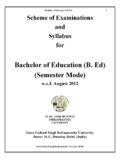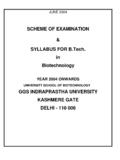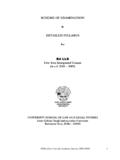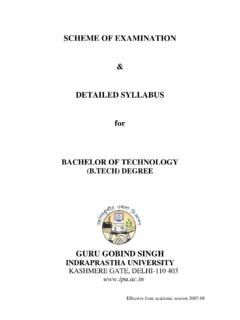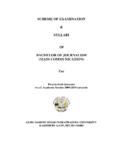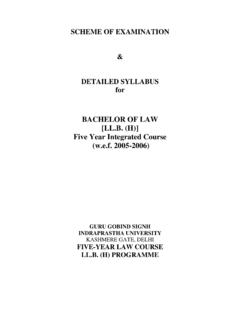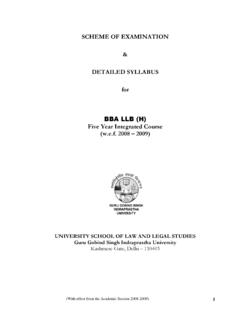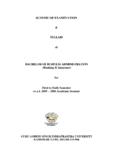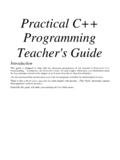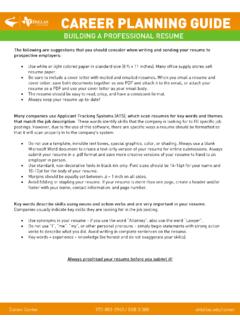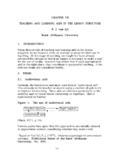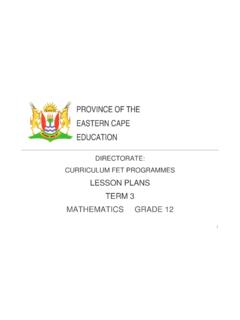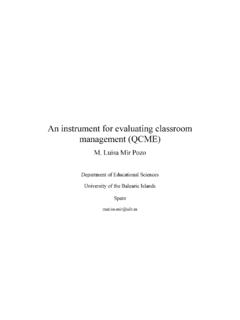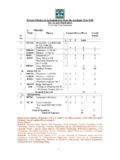Transcription of GURU GOBIND SINGH
1 Syllabus of Master of Computer Applications (MCA), approved by MCA Coordination Committee on 7th May 2010 & Sub-Committee Academic Council held on 31st May 2010. academic session 2010-11 SCHEME OF EXAMINATION & DETAILED SYLLABUS (w. e. f. Academic Year 2010-2011) For MASTER OF COMPUTER APPLICATIONS (MCA) DEGREE guru GOBIND SINGH INDRAPRASTHA UNIVERSITY KASHMERE GATE, DELHI Syllabus of Master of Computer Applications (MCA), approved by MCA Coordination Committee on 7th May 2010 & Sub-Committee Academic Council held on 31st May 2010. academic session 2010-11 Master of Computer Applications FIRST SEMESTER EXAMINATION Paper ID Paper Code Paper L T/P Credit 044101 MCA 101 Fundamentals of IT 3 1 4 044103 MCA 103 Programming in C 3 1 4 044105 MCA 105 Discrete Mathematics 3 1 4 044107 MCA 107 Computer Organization 3 1 4 044109 MCA 109 Principles and Practices of Management 3 1 4 Practical 044151 MCA 151 Fundamentals of IT Lab.
2 0 2 1 044153 MCA 153 Programming in C Lab 0 4 2 044155 MCA 155 Computer Organization Lab. 0 4 2 NUES 044161 MCA 161 General Proficiency I* (It is suggested to have Personality Development and Communication Skills - I Course) 0 2 1 Total 15 17 26 * Non-University Examination System (NUES) Syllabus of Master of Computer Applications (MCA), approved by MCA Coordination Committee on 7th May 2010 & Sub-Committee Academic Council held on 31st May 2010. academic session 2010-11 Master of Computer Applications SECOND SEMESTER EXAMINATION Paper ID Paper Code Paper L T/P Credit 044102 MCA 102 Data and File Structures 3 1 4 044104 MCA 104 Object Oriented Programming in C++ 3 1 4 044106 MCA 106 Operating Systems 3 1 4 044108 MCA 108 Database Management Systems 3 1 4 044110 MCA 110 Software Engineering 3 1 4 Practical 044152 MCA 152 Data and File Structures Lab 0 2 1 044154 MCA 154 Object Oriented Programming in C++ Lab 0 4 2 044156 MCA 156 Database Management Systems Lab 0 2 1 044158 MCA 158 Software Engineering Lab.
3 0 2 1 NUES 044162 MCA 162 General Proficiency II* (It is suggested to have Personality Development and Communication Skills II Course) 0 2 1 Total 15 17 26 * Non-University Examination System (NUES) Syllabus of Master of Computer Applications (MCA), approved by MCA Coordination Committee on 7th May 2010 & Sub-Committee Academic Council held on 31st May 2010. academic session 2010-11 Master of Computer Applications THIRD SEMESTER EXAMINATION Paper ID Paper Code Paper L T/P Credit 044201 MCA 201 Theory of Computation 3 1 4 044203 MCA 203 Computer Graphics 3 1 4 044205 MCA 205 Java Programming 3 1 4 044207 MCA 207 Data Communications and Networking 3 1 4 044209 MCA 209 C# Programming 3 1 4 Practical 044251 MCA 251 Computer Graphics Lab 0 2 1 044253 MCA 253 Java Programming Lab 0 4 2 044255 MCA 255 C# Programming Lab.
4 0 4 2 NUES 044261 MCA 261 General Proficiency III* (It is suggested to have Technical Paper Writing Course) 0 2 1 Total 15 17 26 * Non-University Examination System (NUES) Syllabus of Master of Computer Applications (MCA), approved by MCA Coordination Committee on 7th May 2010 & Sub-Committee Academic Council held on 31st May 2010. academic session 2010-11 Master of Computer Applications FOURTH SEMESTER EXAMINATION Paper ID Paper Code Paper L T/P Credit 044202 MCA 202 Design and Analysis of Algorithms 3 1 4 044204 MCA 204 Data Warehousing and Data Mining 3 1 4 044206 MCA 206 Advanced Computer Networks 3 1 4 044208 MCA 208 Object Oriented Analysis and Design 3 1 4 044210 MCA 210 Web Technologies 3 1 4 Practical 044252 MCA 252 Design and Analysis of Algorithms Lab 0 2 1 044254 MCA 254 Data Warehousing and Data Mining Lab 0 2 1 044256 MCA 256 Advanced Computer Networks Lab 0 2 1 044258 MCA 258 Object Oriented Analysis and Design Lab 0 2 1 044260 MCA 260 Web Technologies Lab 0 2 1 NUES 044262 MCA 262 General Proficiency IV* (It is suggested to have Process Modeling Management Oriented Course)
5 0 2 1 Total 15 17 26 * Non-University Examination System (NUES) Syllabus of Master of Computer Applications (MCA), approved by MCA Coordination Committee on 7th May 2010 & Sub-Committee Academic Council held on 31st May 2010. academic session 2010-11 Master of Computer Applications FIFTH SEMESTER EXAMINATION Paper ID Paper Code Paper L T/P Credit 044301 MCA 301 Linux Programming 3 1 4 044303 MCA 303 Software Testing 3 1 4 044305 MCA 305 Enterprise Computing with Java 3 1 4 Elective - I (Choose any One) 044307 MCA 307 Advanced Database Management Systems 044309 MCA 309 Numerical and Scientific Computing 044311 MCA 311 Software Project Management 044313 MCA 313 Multimedia Technologies 044315 MCA 315 Mobile Computing 044317 MCA 317 Artificial Intelligence 044319 MCA 319 Microprocessors 044321 MCA 321 Compiler Design 3 1 4 Elective - II (Choose any One)
6 044323 MCA 323 Operational Research 044325 MCA 325 Distributed Systems 044327 MCA 327 Financial Accounting 044329 MCA 329 Organizational Behavior 044331 MCA 331 Advanced Computer Architecture 044333 MCA 333 Software Quality Management 044335 MCA 335 Digital Signal Processing 044337 MCA 337 Research Project 3 1 4 Practical 044351 MCA 351 Linux Programming Lab 0 2 1 044353 MCA 353 Software Testing Lab 0 2 1 044355 MCA 355 Enterprise Computing with Java Lab 0 4 2 044357 MCA 357 Lab based on Elective - I 0 2 1 NUES 044361 MCA 361 General Proficiency V* (It is suggested to have Intellectual Property Rights - Software Systems Oriented Course) 0 2 1 Total 15 17 26 * Non-University Examination System (NUES) Syllabus of Master of Computer Applications (MCA), approved by MCA Coordination Committee on 7th May 2010 & Sub-Committee Academic Council held on 31st May 2010.
7 Academic session 2010-11 Master of Computer Applications SIXTH SEMESTER EXAMINATION Paper ID Paper Code Paper L T/P Credit 044302 MCA 302 Dissertation - - 26 NUES 044362 MCA 362 General Proficiency VI* (Seminar and Progress Report) - - 4 Total - - 30 * Non-University Examination System (NUES) The student will submit a synopsis at the beginning of the semester for approval from the departmental committee in a specified format. The student will have to present the progress of the work through seminars and progress reports. Note: 1. The total number of the credits of the MCA programme = 160. 2. Each student shall be required to appear for examinations in all courses. However, for the award of the degree a student shall be required to earn the minimum of 150 credits Syllabus of Master of Computer Applications (MCA), approved by MCA Coordination Committee on 7th May 2010 & Sub-Committee Academic Council held on 31st May 2010.
8 Academic session 2010-11 Code No.: MCA 101 L T C Paper: Fundamentals of Information Technology 3 1 4 INSTRUCTIONS TO PAPER SETTERS: 1. Question No. 1 should be compulsory and cover the entire syllabus. There should be 10 questions of short answer type of 2 marks each, having at least 2 questions from each unit. 2. Apart from Question No. 1, rest of the paper shall consist of four units as per the syllabus. Every unit should have two questions to evaluate analytical/technical skills of candidate. However, student may be asked to attempt only 1 question from each unit. Each question should be 10 marks including subparts, if any. OBJECTIVE: This course is an introductory course in information technology.
9 Topics include foundations in hardware, software, data and an overview of the use of information technology in organizations. Topics include basics of graphics, systems development, database design and networking. Upon completion of this course the student should be able to: Describe the major components of information technology applications: Hardware, computer networks, software, data, processes, and people. Describe the different components of a computer network. Demonstrate an understanding of different types of networks. Define "Software Engineering". Demonstrate an understanding of the importance of algorithms in the development of IT applications. Discuss the role of databases in IT applications. PRE-REQUISITE: None UNIT I Digital Signals and Logic gates, Number systems: Binary, octal and hexadecimal number systems, signed binary number, binary arithmetic, 2 s complement arithmetic, Microprocessors: Introduction, System Bus, Architecture and operation of 8085 microprocessor and instruction set.
10 [No. of Hrs: 10] UNIT II Introduction to software: Software types and Software Development activities (Requirement, Design (algorithm, flowchart, decision table and tree), Coding, Testing, Installation, Maintenance). Low and high level languages, assemblers, compilers, interpreters, linkers. Introduction to Graphics primitives: Display Devices: Refresh Cathode Ray Tube, Raster Scan Display, Plasma Display, Liquid Crystal Display, Plotters, Printers, Keyboard, Trackball, Joystick, Mouse, Light Pen, Tablet and Digitizing Camera. External Storage devices. [No. of Hrs: 12] UNIT - III Introduction to Operating system, Different types of operating systems and its working, DOS commands, File Structure and Storage, Introduction to process management: process, threads, scheduling and synchronization.

